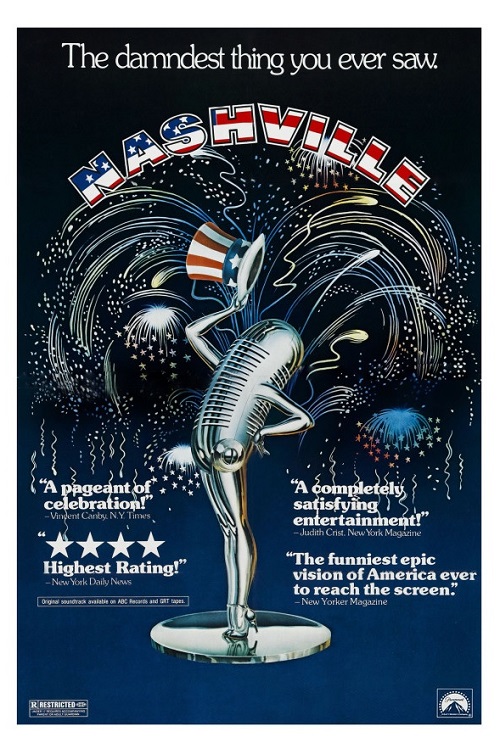
NASHVILLE
(director: Robert Altman; screenwriter: Joan Tewkesbury; cinematographer: Paul Lohmann; editor: Dennis M. Hill/Sidney Levin; music: Richard Baskin; cast: Henry Gibson (Haven Hamilton), Ronee Blakley (Barbara Jean), Michael Murphy (John Triplette), Lily Tomlin (Linnea Reese), Ned Beatty (Delbert Reese), Keith Carradine (Tom Frank), Geraldine Chaplin (Opal), Karen Black (Connie White), Dave Peel (Bud Hamilton), Shelley Duvall (Marthe aka “L. A. Joan”), Allen Garfield (Barnett), Scott Glenn (Pfc. Glenn Kelly), Jeff Goldblum (Tricycle Man), Timothy Brown (Tommy Brown), David Arkin (Norman), Barbara Baxley (Lady Pearl), Barbara Harris (Albuquerque), Gwen Welles (Sueleen Gay), Robert DoQui (Wade Cooley), Keenan Wynn (Mr. Green), David Hayward (Kenny Fraiser), Allan Nicholls (Bill), Cristina Raines (Mary), Bert Remsen (Star), Merle Kilgore (Trout), Richard Baskin (Frog), Jonnie Barnett (Jonnie Barnett), Sue Barton (Sue Barton), Carol McGinnis (Jewel), Elliott Gould (Himself), Julie Christie (Herself), Vassar Clements (Herself); Runtime: 157; MPAA Rating: R; producers: Robert Altman/Martin Starger/Jerry Weintraub; Paramount Home Entertainment; 1975)
“In its ambitions to say something big and different about the American political scene rises to the occasion to be a fascinating technical achievement and a strangely insightful character study … .”
Reviewed by Dennis Schwartz
Robert Altman’s (“Short Cuts”/”Thieves Like Us”/”The Long Goodbye”) puzzling satirical masterpiece, treading on shallow water but somehow in its ambitions to say something big and different about the American political scene rises to the occasion to be a fascinating technical achievement and a strangely insightful character study of those in the pop culture scene doing their hysterical celebrity thing that includes going after sex, money, fame and power. Joan Tewkesbury’s screenplay throws in a background political story that never connects the dots but gives off an eerie mood of an America in the process of reinventing itself from recent missteps over the Vietnam War and the corrupt Nixon White House. In the process of doing its political thing it gives the best look at the Nashville ‘Country and Western’ scene ever on film, and proves to be the ultimate 1970’s film that plays out as a metaphor for America. Uniquely filmed in a sprawling and messy style, without a narrative, it deliciously covers the various activities of 24 characters (musicians, managers, politicians, promoters, drifters and music lovers) during a hectic five days in Nashville.
The song “I’m Easy,” written for the film and performed by Keith Carradine, won an Oscar for Best Song, which began a trend for such composer-singer creations getting rewarded by the Academy.
Nashville is the scene of a country music festival that coincides with a presidential campaign. Michael Murphy is the oily blue-suited, smiling, smooth-talking advance man and presidential campaign manager for the unseen third-party candidate, Hal Phillip Walker of the Replacement Party, who arrives in Nashville to promote a political rally concert that will be syndicated across the country and is busy recruiting singing talent for the show. TV’s Laugh-In star Henry Gibson is the unofficial spokesperson for Nashville, as he’s the Grand Ole Opry country singing star with an ego as big as the state, is uptight about being of short-stature, and presents himself as a phony, someone secretly hungering for political power and is annoyingly sanctimonious over appearance and song. Ronee Blakley is the reigning queen of country-western music, who comes out of the hospital to perform even though she’s exhausted, fragile and mentally unstable. Allen Garfield is Ronee’s crude, nasty and manipulative husband/manager. Lily Tomlin is the white singer in a black gospel choir, who is adulterous with visiting narcissistic folk singer Keith Carradine but a good mother to her two adolescent deaf children. Ned Beatty is Lily’s plump husband and the dodgy leading lawyer in town is busy assisting Murphy in the political fund-raising rally to be held outdoors at the Parthenon. Geraldine Chaplin is the pushy BBC reporter who goes everywhere with a tape recorder and inanely comments on all the activity around her. These and many other colorful characters intertwine during the festivities with vignettes moving seamlessly without missing a beat from music to sex to politics, and eventually with a controversial assassination of a country singer at the Parthenon. I found it to be a brilliant cinematic accomplishment, one that kept my attention throughout despite its demanding 157 minutes.
REVIEWED ON 2/21/2008 GRADE: A+